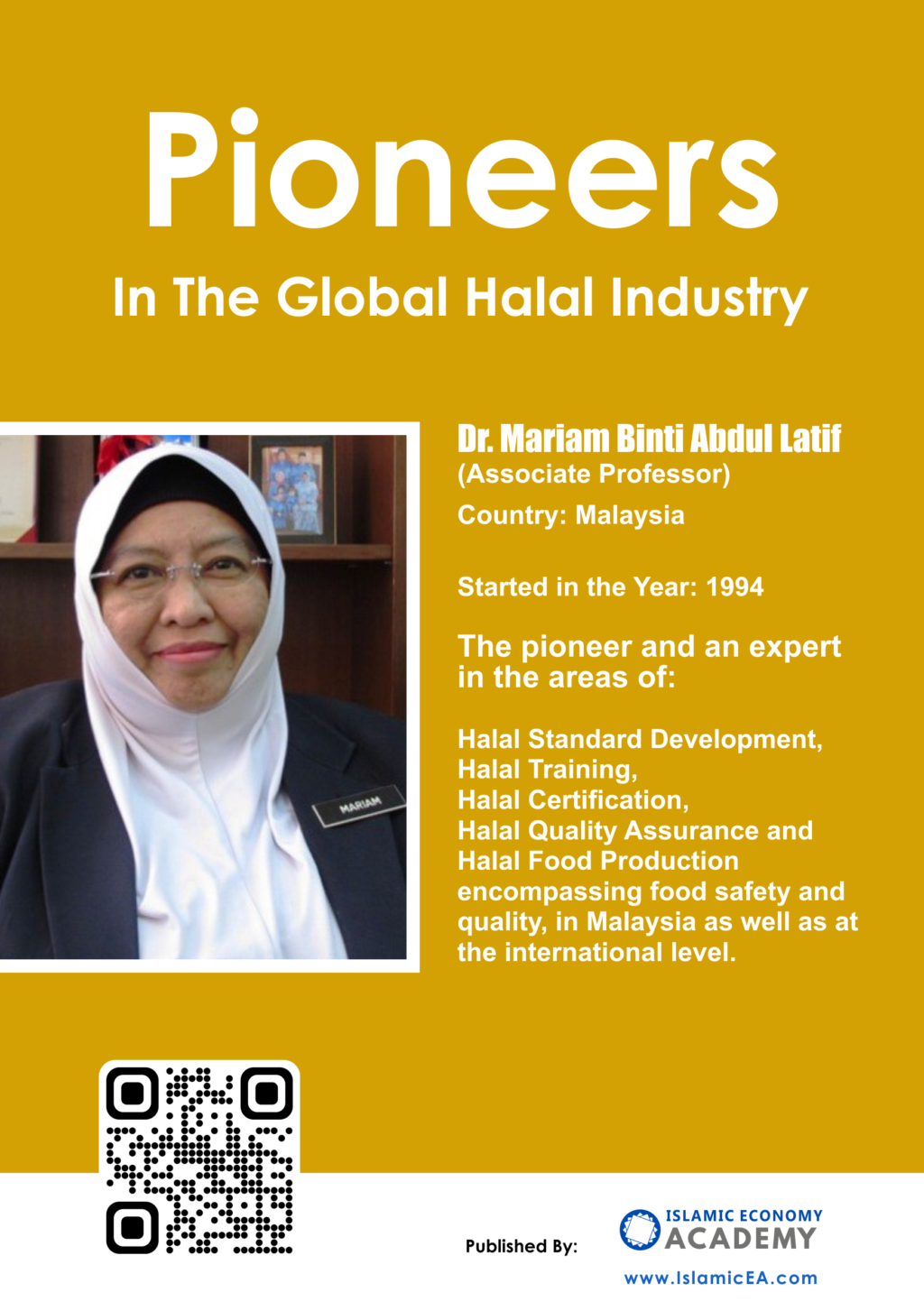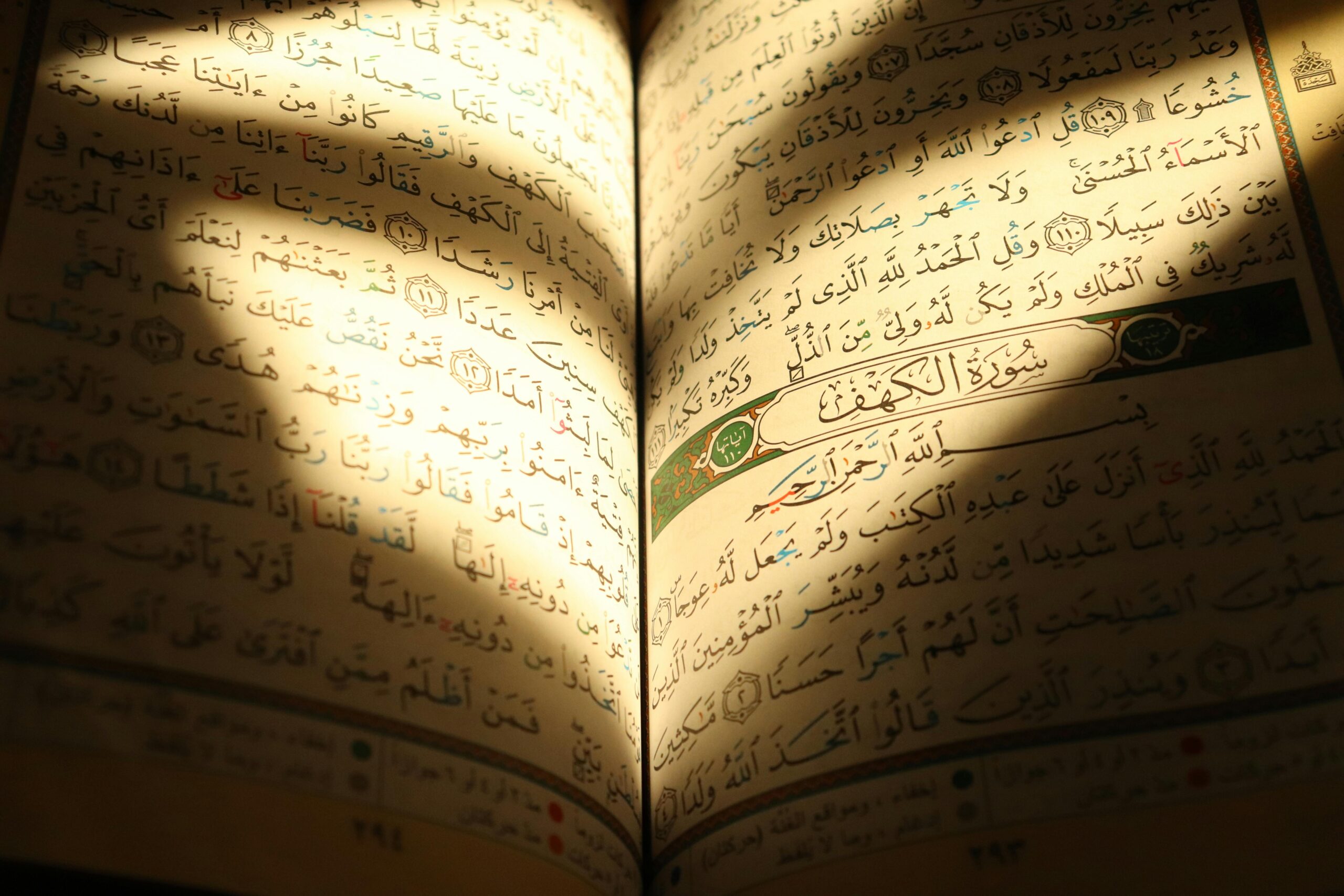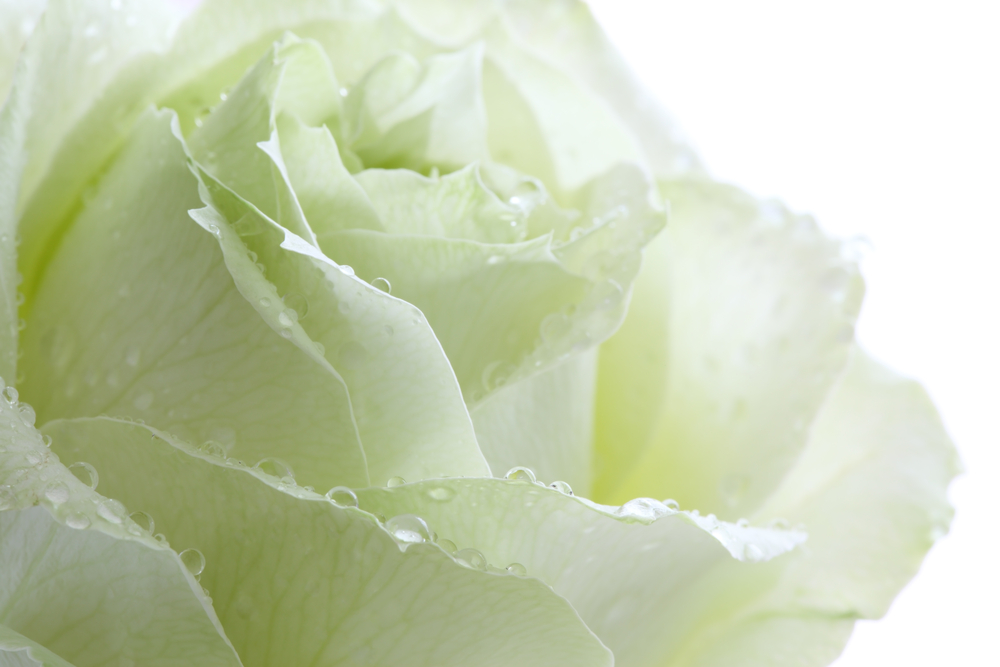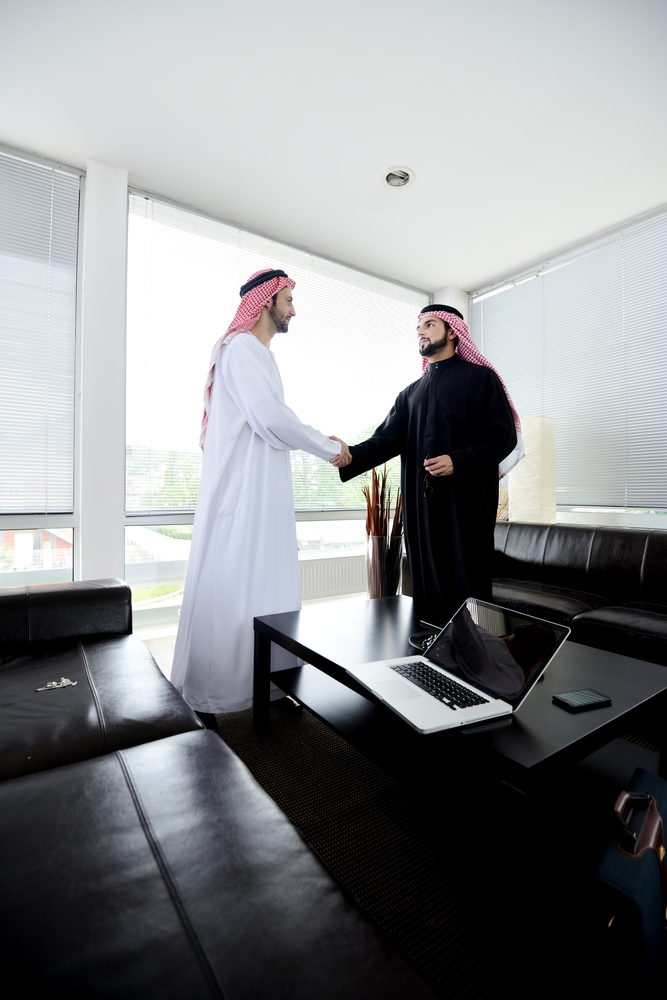Name: Dr. Mariam Binti Abdul Latif (Associate Professor)
Country: Malaysia
Started in the Year: 1994
Significant Positions:
- Vice President (Halal Integrity), Halal Development Corporation (HDC), Ministry of International Trade and Industry(MITI), Malaysia: 2007-2010 (Secondment)
- Senior Food Technologist (Kader Post), Halal Hub Division, Department of Islamic Development Malaysia (JAKIM), Malaysia: 2004-2007 (Secondment)
- Food Technologist, Ministry of Health (MOH), Malaysia: 1994-2011
Background and Personal History
Personal Introduction:
Dr. Mariam Abdul Latif earned her doctoral degree – Doctor of Philosophy (PhD) in Halal Food Product Management from Universiti Putra Malaysia (UPM) in 2019. She had earlier obtained a Master of Science in Halal Food Service Management in 2004 from the same university. UPM is where she began her first tertiary education way back in 1977, where she studied for a Diploma in Agriculture. Dr. Mariam also holds a B.Sc. Nutrition (Hons) from King’s College, University of London, London, United Kingdom, which she obtained in 1990. Subsequently, she pursued a Post-Graduate Diploma in Community Nutrition from Universiti Indonesia, Jakarta, Indonesia, completing it in 1992.
Dr. Mariam originally hails from the state of Negeri Sembilan, Malaysia, having been born in Kampung Juaseh, a village in the state’s district of Kuala Pilah, in November 1955. Having been married to Mr. Kamaruddin Md Yusof for over 40 years, they are blessed with a son and are doting grandparents to 3 grandchildren.
Dr. Mariam was honoured with being the first recipient of the “Outstanding Personal Achievement in The Halal Industry” awarded under the patronage of H.E. Mr. Ihsan Övüt, Secretary General of SMIIC (Standards and Metrology Institute For Islamic Countries), the standardization body of the OIC (Organisation Of Islamic Cooperation) in 2020 (https://iHalalawards.com/winners.html). She also received several awards for Best Performance at the university level.
Professional Introduction:
Dr. Mariam Abdul Latif garnered 15 years of experience in farming and agriculture with the Department of Agriculture Malaysia, teaching Food Processing, Agronomy, Extension, and Landscape at the Institute of Agriculture in Air Hitam located in Malaysia’s state of Johor and Serdang, situated in the state of Selangor. This wealth of experience proved to be a solid backbone to her contributions to the Halal industry, which she started to get involved in 1994 when she was posted as a Food Technologist in the Ministry of Health Malaysia. In this role, she was responsible for the food safety and quality programme in the states of Negeri Sembilan, Pahang, Selangor and Kuala Lumpur, where food safety and quality complete the congruence of the Halalan Toyyiban decree by Allah s.w.t for the consumption of His rizq.
Two years after joining the Ministry, she was given the task of establishing the office for Codex Contact Point (CCP) of Malaysia upon the official reassignment of the office to the Ministry’s Food Safety and Quality Division (FSQD), taking over from the Standards Industrial Research Institute of Malaysia (SIRIM). Thereafter, Dr Mariam represented the country by assuming the role of Malaysia’s Liaison Officer, as well as being the Chief Secretariat for the National Codex Committee and the Codex Regional Representative for Asia from 1996 to 1998.
One of her most significant contributions to the global Halal industry commenced during this period, particularly with her active involvement in the development of the Draft General Guidelines for the use of the term “Halal” in food labeling under the Codex Alimentarius (“food code” in Latin) which is a collection of internationally adopted food standards and related texts presented uniformly. These food standards and related texts aim at protecting consumers’ health and ensuring fair practices in the food trade. She assisted Dato Dr. Wan Mahmud Othman, then Malaysia’s Deputy Director-General of Health, in defending the draft paper, which was successfully adopted in 1997 in Geneva, Switzerland, as document no. CXG 24-1997 (https://www.fao.org/fao-who-codexalimentarius/codex-texts/guidelines/en).
She was subsequently appointed as the Consultant to Codex Secretariat at the Food and Agriculture Organization (FAO) of the United Nations in Rome, Italy, from January to July 2001 and the month of February 2005. During her consultancy at FAO in Rome, she was assigned to give a lecture on the work of Codex and the adopted Halal guidelines at the Codex Regional Workshop of the Far East at Teheran, Iran, in March 2001. That was her first experience presenting a paper in the international arena, the start of many more in years to come, which contributed to the continuance of CXG 24-1997 as one of the key reference documents for Halal in the international trade arena.
From April 2004 to January 2007, Dr Mariam was seconded to the Department of Islamic Development Malaysia, renowned globally via its acronym in the Malay language – JAKIM. She was posted to the role of Senior Food Technologist cum Chief Scientist. It is a post termed in Malaysia as a “Kader post”, which means that even though she was working in JAKIM, her ultimate reporting structure was to the Ministry of Health. Amongst her notable initiatives during this tenure were establishing the technical audit team and developing the Halal Malaysia certification system based on the ISO-level Malaysian Standard MS 1500: 2004 Halal food – production, preparation, handling and storage – General guidelines (First Revision). She was also involved in the publication of the Handbook of Halal Ingredients, translating the Halal Malaysia Manual Procedure from Malay to English, and drafting the National Halal Laboratory concept paper.
She had another secondment post from February 2007 to July 2010, this time as Vice President (Halal Integrity) at the then Halal Industry Development Corporation, now renamed as Halal Development Corporation (HDC) – a government agency under the Ministry of International Trade and Industry (MITI), Malaysia. She had optimised this role to the best of her ability to further benefit the Ummah by leading and or pioneering more Halal initiatives, to name but a few:
- developed the world’s first structured Halal training programme; and
- spearheaded several protem committees to draft Halal standards for submissions as new proposals to the Department of Standards Malaysia (DSM) to be considered as new Malaysian Standards, as well as becoming the first ISO-level standards globally, namely for:
a. pharmaceuticals – which was subsequently published by DSM as a Provisional Standard in 2010, thereafter as a full official standard – the MS2424: 2012 Halal Pharmaceuticals – General Guidelines. This standard is now available as MS2424: 2019 Halal Pharmaceuticals – General Requirements (First Revision), and
b. logistics – which was published subsequently by DSM as MS2400: 2010 Halalan Toyyiban Assurance Pipeline series comprising 3 parts covering transportation, warehousing, and retailing. The series is now available as MS2400: 2019 Halal Supply Chain Management System – General Requirements series comprising the same 3 parts.
Dr. Mariam completed her remaining 1.5 years of service as a government officer by performing monitoring and enforcement work for food safety in the Ministry of Health in the state of Selangor. She took a short hiatus from work upon her retirement in 2011 to fulfill her duties to perform the Haj. Subsequently, she took up the offer to be an Associate Professor, at the Faculty of Food Science and Nutrition, Universiti Malaysia Sabah, located in Kota Kinabalu, Sabah, one of the two Malaysia’s states on the Borneo Island. She held the post of Senior Fellow, at the Faculty of Food Science and Nutrition at the same university from January 2019 until December 2022. She continued with her contributions to the Halal industry by doing some publications related to Halal standards and certification in the Halal Food Handbook, as well as in consumer studies about Halal food consumption. She also initiated the Halal Nutrition paradigm in the Halal ecosystem through her paper “Halal Nutrition – The New Paradigm in Health – A Review” in the journal “Current Trends in Biomedical Engineering and Biosciences” (Abdul Latif, M. 2018. Juniper Publishers. Volume 13, Issue 3, April 2018. ISSN 2575-1151). She also published some other related Halal nutrition papers in various journals.
Throughout her career life, Dr. Mariam has delivered more than 100 presentations on Halal food, Halal standard, Halal law, Halal certification, Halal consumerism, Halal nutrition, and Halal hub in Malaysia and other countries, including France, South Africa, Thailand, Singapore, Taiwan, Korea, Indonesia, Philippines, Brunei Darussalam, Japan, Australia, China, Turkey, Bangladesh, Russia, United Arab Emirates, Kuwait, Iran and Chile.
Personal Journey:
- What is your background, and how did you get started in the Halal industry?
I have an agriculture and food science and nutrition background. I started getting involved in Halal industry when Malaysia proposed the draft guideline “on the use of the term Halal” under the Codex Alimentarius Commission. After its adoption as an international Halal food standard, I was invited to speak at many events about the development and eventually the adoption of this standard. It continued with my Masters and PhD studies in Halal food management.
- What inspired you to pursue a career in the Halal sector?
The commitment as a Muslim is to learn more about the beauty of the Quran and Sunnah and to disseminate the knowledge involved in Halal industry.
- Can you describe your educational and professional background before entering the Halal industry?
About my educational background, I had my Diploma in Agriculture in 1977 followed by my Degree in Nutrition in 1990 in London. Then I had my postgraduate diploma in Community Nutrition in 1992 in Indonesia. I did my Masters in 2002 and my PhD on Halal food management in 2019 at Universiti Putra Malaysia, Serdang, Selangor, Malaysia.
My professional background related to Halal industry started when I defended the draft guidelines for “Use of the Term Halal” at the Codex Alimentarius Commission (CAC), when it was adopted in 1997. (CAC is a joint body of FAO and WHO, an intergovernmental network developing international food standards). It then continued with the Malaysian Halal standard development from 1998 until now and Halal certification and audit programs under JAKIM from 2004 until 2007. Being the Vice President (Halal Integrity) of the Halal Industry Development Corporation (HDC) Malaysia (2007-2010) I developed the first world structured Halal training program and initiated the Halal reference centre. Next, I gave lectures on Halal topics at the Universiti Malaysia Sabah (2012-2022). Now I am a freelance trainer on Halal industry programs whenever I am requested to.
Motivations and Influences:
- Who or what were your biggest influences when you began your journey in the Halal industry?
My late Supervisor, Prof. Dr. Yaakob Che Man, was the one who encouraged me to further my studies on Halal food besides my husband and my son who had been my main pillar in my journey in exploring Halal industry. From academic perspective, my big influence come from Prof. Dr. Sharifuddin Md. Shaarani, Dr. Noriah Ramli, and Dr. Alina A. Rahim and from professional aspects, my big influence was from Dato’ Dr. Harrison Shahabudin, Ms. Rozi Osman, Datuk Fadilah Baharin and Dr. Hani Mansour Al-Mazeedi.
Being aware that Halal was a new term in the international arena influenced me to continue my journey in Halal industry. And I understand that Halal industry was a new market in 2000 and many people were interested to know more about Halal terms and its relationship with the industry, be it food, food ingredients, cosmetics, pharmaceuticals, logistics, banking and tourism industry.
- How does your personal faith and beliefs influence your work in the Halal industry?
As a Muslim, I am committed to studying the Quran and the hadiths related to Halal and tayyiban matters. I am also committed to eat only Halal and tayyib food and beverages wherever I go.
Industry-Specific Contributions
Sector-Specific Questions:
- Which sector of the Halal industry are you involved in (food, finance, pharmaceuticals, cosmetics, logistics, tourism, etc.)?
I am involved in Halal food, pharmaceutical, logistics, cosmetics and tourism industry, particularly in their standard development.
In Halal food industry, I am involved in its laws and standards, certification, quality assurance programs and enforcement activities.
- What were the main challenges you faced when you started in this sector?
There is not much books or literature available to refer to. There are not many people who are involved personally in the Halal industry.
- Can you highlight some key innovations or contributions you have made in this sector?
Some key innovations I made for the Halal industry are:-
I was defending the draft guidelines for “Use of the Term Halal” at the Codex Alimentarius Commission when it was adopted in 1997.
I developed the Halal certification audit and certification approval under JAKIM in 2004.
I first developed the structured Halal Training Programs (Awareness, Midterm and Professional level) under HDC in 2008.
I developed the first Halal Training modules under the Food Science and Nutrition Faculty, Universiti Malaysia Sabah and later expanded it to be one of the courses offered at the Masters level.
Market Insights:
- How has the Halal industry evolved since you first entered it?
Halal industry had expanded tremendously over the years. It is projected to reach USD 3 billion worth in trade by 2060.
- What trends do you see currently shaping the future of the Halal industry?
The trend is it seems all countries in the world are emulating Malaysia to develop their own niche Halal industry, be it food ingredients, cosmetics, pharmaceuticals, logistics and Muslim-friendly tourism.
The trend is joining the market demand for Halal food products and services had pushed many sectors to expand their market and potential.
The increasing trend of usage of Halal products and services by non-Muslims also play a role in the increasing economy of Halal products and services.
Challenges and Achievements
Overcoming Challenges:
- What are some significant obstacles you have encountered in your career?
Not enough literature indicating there is still a lot more to be done in R&D on Halal industry.
- How did you overcome these challenges?
I just rely on available literature there is related to the Halal industry.
Achievements:
- What do you consider to be your most significant achievement in the Halal industry?
My most significant achievements in Halal industry are:
I was defending the draft guidelines for “Use of the Term Halal” at the Codex Alimentarius Commission when it was adopted in 1997. Hence, the guidelines have been referred to by many on making their own Halal food standards or guidelines.
I developed the Halal certification audit and certification approval under JAKIM in 2004. It has helped many companies to abide or fulfill all the requirements set in the Halal laws and standards.
I drafted the Halal Laboratory under JAKIM in 2006 which is now being materialised.
I first developed the structured Halal Training Programs (Awareness, Midterm and Professional level) under HDC in 2008. These training programs have been a reference to many who wanted to start their own training programs, be it private organizations or teaching institutes/universities.
I initiated the Halal Reference Centre under HDC in 2009
I developed the first Halal Training modules under the Food Science and Nutrition Faculty (FSMP), Universiti Malaysia Sabah in 2012 and later expanded it to be offered at the degree level and eventually became one of the courses offered at the Masters level at FSMP in 2018.
- Are there any specific projects or milestones that you are particularly proud of?
I am so pleased with the adoption of the first international Halal food guidelines under the Codex Alimentarius Commission in 1997 and the development of the Malaysian Halal food standard which was first published in the year 2000.
I am very happy with my Halal training programs (containing 3 stages of learning) which have been referred by many and also my training modules (comprising of Basic principles of Halal and haram, Halal laws and regulations, Halal standards, Halal food production, Halal food ingredients and additives, Halal certification, Halal quality assurance, Halal food control, Halal food labelling, Halal food traceability, Halal food trade, Halal food analysis, Halal food chain and Halal food logistics), which had been referred by many teaching organizations and universities.
I am happy that the JAKIM laboratory is operating well.
Impact and Legacy
Industry Impact:
- How has your work impacted the Halal industry in your country and globally?
My understanding on the Halal industry perspective in Halal standards, certification and all issues related to it has been presented in various seminars, conferences, workshops and fora be it in my country or overseas.
- What changes have you seen in consumer behaviour and industry practices due to your efforts?
Many people have understood the word Halal and what is its implications for Halal industry if it is defaulted. Many companies would send their manpower to attend Halal trainings so that they can understand the Halal industry needs to comply to Halal requirements meeting the Shariah principles.
Social Responsibility:
- How do you ensure that your work adheres to ethical and Halal standards?
As a Muslim, I will continue to study Halal matters related to the industry and present it to the public whenever I am requested to do so.
- What initiatives have you taken to promote sustainability and social responsibility within the Halal industry?
I keep my communication open to all colleagues who are involved in Halal programs and continue to contribute as requested.
Future Vision
Future Plans:
- What are your plans for the future within the Halal industry?
I plan to continue to disseminate the word Halal and tayyib to everyone I meet. It is a form of dakwah as well. I will continue with my training as per request.
- What goals do you still hope to achieve?
I hope to see one day there will be one global Halal ecosystem where all countries will use one Halal standard, one Halal certification system, well-coordinated control of Halal products and services, smooth flow of Halal food chain with integrity and one shared consumer group.
Advice to Aspiring Professionals:
- What advice would you give to young professionals looking to enter the Halal industry?
I would advice them to continue studying the Halal industry, be it in the form of its development, its challenges, its issues, its consumer development, the legislative areas and the practices of the industry for a better understanding of the Halal industry and the Halal ecosystem.
- How can the next generation continue to innovate and improve the Halal industry?
The next generation needs to continue doing R&D, understand and act or practice to consume or use all Halal food and products and services.
Cultural and Global Perspectives
Global Perspectives:
- How do you see the global Halal industry differing from country to country?
There are minimal differences now compared to many years ago when every country has its own Halal standards and certification programs.
Many countries now have gained in economic aspects after they get involved in Halal industry development.
- Can you share any experiences or collaborations with pioneers from other countries?
I had my first experience when I was with HDC, when I wanted to harmonize the Halal certification among all Halal certification bodies throughout the world.
Cultural Integration:
- How do you integrate local cultural practices with global Halal standards in your work?
Malaysia, being an Islamic country it is quite easy to integrate the work of Halal into the requirements of Halal standards among the industries.
- What are some of the cultural challenges you have faced, and how did you address them?
Some problems occurred when the workforce of a company does not understand about Halal or tried to cheat the consumers through food fraud. The need for more and better enforcement.
In addressing these challenges, I provide Halal training to any organization that asks for my service.
Networking and Collaboration
Industry Relationships:
- Who have been your key partners and collaborators in your journey?
Many have been my key partners such as CCM Malaysia, Nestle Malaysia, Standards Malaysia, HDC Malaysia, JAKIM Malaysia, KISR Kuwait, GIMDES Turkey, ChileHalal, Universiti Malaysia Sabah and International Islamic University Malaysia (UIA).
- How important is networking within the Halal industry, and how have you built your network?
It is very important to network with the Halal industry. I developed my network by meeting friends through meetings, conferences, and through the social media.
Reflective Questions
Personal Reflection:
- Looking back on your career, what would you have done differently?
I would have started my study on Tauhid, Fiqh and Akhlak and continued in-depth study on Halal industry which will include the government (the laws and regulations, standards and certification, control and enforcement), the industry (its certification system, issues and challenges in food production, quality assurance, food traceability, food control and suppliers), and the consumers (their perception, knowledge, attitude and practices on Halal food, Halal labelling, Halal complaints and Halal issues).
- How do you balance personal life and the demands of being a pioneer in the Halal industry?
With the help of my husband, my son, my daughter-in-law and three grandchildren, I managed to lead my personal life successfully. And likewise with the support from all my colleagues and teamwork wherever I go, I managed to perform very well at work.
Legacy and Impact:
- How would you like to be remembered in the Halal industry?
I would like to be remembered as the pioneer and an expert in the areas of Halal standard development, Halal training, Halal certification, Halal quality assurance and Halal food production encompassing food safety and quality, in Malaysia as well as at the international level.
- What legacy do you hope to leave behind for future generations?
My legacy for the future generations is:
- Halal food standard
- Halal food training
- Halal food certification
- Halal control
- Halal industry and
- Halal ecosystem
Copyright © Islamic Economy Academy. All rights reserved. No part of this publication may be reproduced in any form or by any means, including photocopying, recording, or other electronic or mechanical methods, without the prior written permission of the publisher, except in the case of brief quotations embodied in critical reviews and certain other noncommercial uses permitted by copyright law. For permission requests, please write to the publisher at info@islamicea.com.






